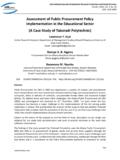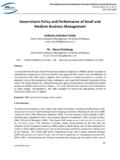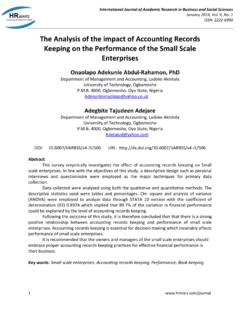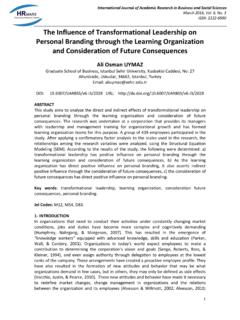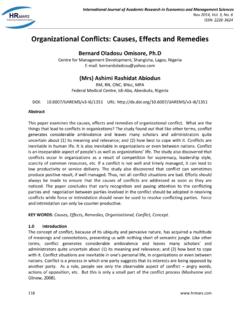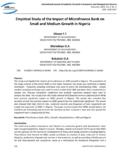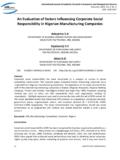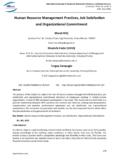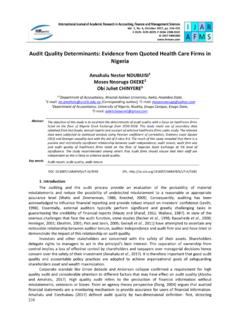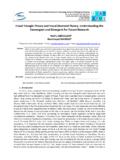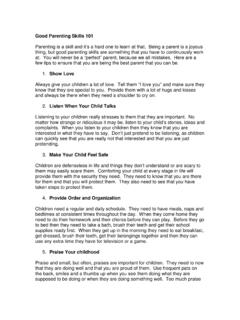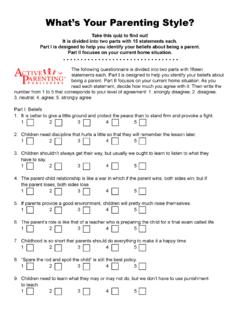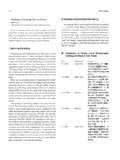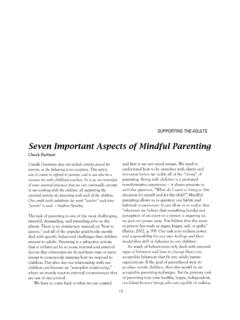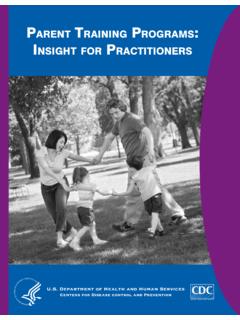Transcription of The Relationship among Parenting Styles, Self-Efficacy ...
1 International Journal of Academic Research in Progressive Education and Development January 2015, Vol. 4, No. 1 ISSN: 2226-6348 219 The Relationship among Parenting styles , Self-Efficacy , and Academic Achievement among Students Hossein Taran ( ) Department of Psychology, Zanjan Branch, Islamic Azad University, Zanjan, Iran. Siavash Kalantari ( ) Department of Psychology, Zanjan Branch, Islamic Azad University, Zanjan, Iran. Corresponding Fateme Dahaghin ( ) Department of Psychology, Zanjan Branch, Islamic Azad University, Zanjan, Iran.
2 Zahra Shahsavari Abhari ( ) Department of Psychology, Zanjan Branch, Islamic Azad University, Zanjan, Iran. DOI: URL: Abstract: This study aimed to investigate the Relationship among Parenting styles , Self-Efficacy , and achievement among students. This study used ex post facto research method. The population consisted of all high school students in Zanjan in academic year 2014-2015. Using multi-stage cluster sampling method, 400 participants were selected as sample. The Scheffer s Parenting styles questionnaire and Scherrer s Self-Efficacy questionnaire were used to collect the data.
3 The results showed that there was a significant Relationship among Parenting styles , Self-Efficacy , and academic achievement among students. Keywords: Parenting styles , Self-Efficacy , academic achievement, students. Introduction: The effect of family on all-round development of children stars from birth, emerges with special power, and remains throughout the life (Navabinejad, 1996). The Parenting styles are a set or constellation of behaviors that explain the parent-child interactions over a wide range of situations. It is assumed that it creates an impressive interaction atmosphere (Alizadeh and Andrais, 2002).
4 Conducting the longitudinal studies by observing the interaction between parents and children, Bamrind (1971,1989,1991) stated that the Parenting styles include different, objective, and natural behaviors which parents use to control and socialize their children (Bamrind, 1991). He found that various Parenting styles differ in two dimensions: demand and control, acceptance and response. The various combinations of demand / control and acceptance / response create four Parenting style methods. The Bamrind research focused on three methods. The fourth method, negligent, has been studied by other researchers International Journal of Academic Research in Progressive Education and Development January 2015, Vol.
5 4, No. 1 ISSN: 2226-6348 220 (Kalantari, 2008). There is much research has been conducted on parents' Parenting styles . The results show that there is Relationship between Parenting styles and variables such as academic achievement, Self-Efficacy , self -concept, self -esteem, and social skills (Yousefi, 2007). In this study, we examined the Relationship among Parenting styles , Self-Efficacy , and academic achievement among students. The concept of Self-Efficacy was first developed by Bandura in 1977 based on social cognitive theory (Ahmadian, 2005).
6 Bandura defines Self-Efficacy as a person's ability to perform a specific action in dealing with a specific position. In other words, Self-Efficacy refers to the judgments of individuals in relation to their abilities to perform a defined action (Yazdani, 2009). To fully understand themselves, the people need to be aware of what they think and what they really are. The proper estimation level of behavior standards determines our Self-Efficacy feeling. The family structure is a major factor in the formation of Self-Efficacy . It may play an effective role in creation of Self-Efficacy among the individuals.
7 If parents impact positively on the development of children's abilities during childhood, there will be suitable situation to actualize their talents for development and control of their internal beliefs. Thus, it can be said that Self-Efficacy follows partly from inheritance rules. It is observed that the children with low Self-Efficacy have grown up in stressful families (Morovati Sharifabad & Roohani Tonekaboni, 2009). In a study, Ahmadian (2005) showed that Parenting styles have a significant impact on children's Self-Efficacy . The Relationship between Parenting styles and academic achievement is another hypothesis was examined in this study.
8 The family influence is one of the most effective and the most influential factor in the character of students. For this reason, the family situation should also be considered in the study of students academic problems. The academic achievement is the scientific progression and rise in specified time situations which can be calculated by final average at the end of school year (Mehr Afrooz, 2008). In general, the academic achievement refers to academic success of students which is measured based on the tests (Hosseini Nasab & Vojdan Parast, 2002).
9 In a study, Mehr Afrvooz (1999) and Dehgani (2000) showed a significant and positive Relationship between Parenting styles and academic achievement. This study aims to investigate the Relationship among Parenting styles , Self-Efficacy , and academic achievement among the students. Methodology: This study used ex post facto research method. The population consisted of all male and female third degree high school students in Zanjan in academic year 2014-2015. Using multi-stage cluster sampling method and Morgan table, 400 participants were selected as sample.
10 Scheffer s family environment questionnaire: this questionnaire consists of 77 questions which measures the different aspects including control/freedom and intimacy/non-intimacy of parents family relationships. The participants answer the questions based on five item Likert scale: from strongly agree to strongly disagree. Naghashiyan (2006) reported that the reliability coefficient of his questionnaire is Scherer s Self-Efficacy questionnaire: This scale was developed by Scherer et al in 1982. This scale has 23 items (Ahmadian, 2008). Scherer et al (1982) reported that the alpha Cronbach is The students' total grades average was the criterion to measure their academic achievement.
